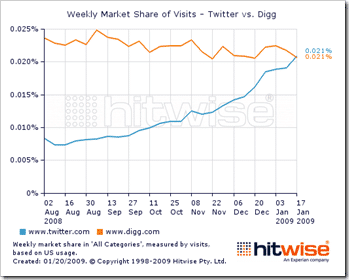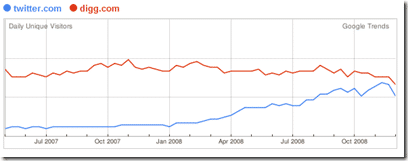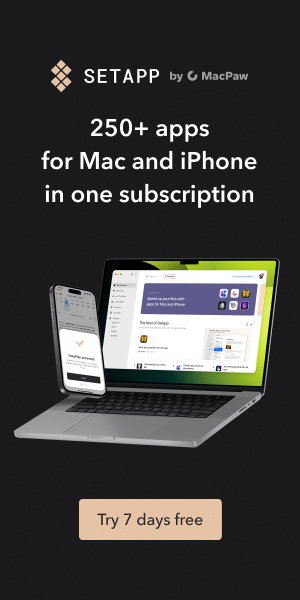We all know about the site Digg, right? It is a place “to discover and share content.” Somebody (or you) submits an article or video or news item into the Digg “community” and if people like it, they increase the story’s popularity by clicking on a “Digg button” which increments a counter. The higher the count of people liking it, or “Diggs”, the higher the story rises on the Digg site. Think of it as a popularity contest. So much so, that if the story you submitted reaches astronomical numbers, the more of a chance that you will get on Diggnation, a video podcast hosted by Kevin Rose (co-founder of Digg) and Alex Albrecht (co-host of Diggnation). However, I’m now starting to wonder if Digg has hit its prime and Twitter is now starting to overshadow them. ((Twitter surpasses Digg’s market share))
Getting “Dugg” can do wonders for your site’s exposure and traffic. All of us writers and bloggers do our best to have Digg badges prominently displayed on our sites. I must admit, I have yet to hit that home run that blows my site out of the water (sometimes it isn’t good to get Dugg as it can bring webservers to their knees with huge amounts of traffic). But now that I think back, I realized that I actually used Twitter (@hightechdad) more to try to actually increase my Digg traffic.
Whenever I write a blog article, my blog automatically sends out a post to Twitter (a “Tweet”) informing the Twitterverse that there is new content on my blog. If people express interest or enthusiasm in one of the posts, I try to get them to Digg it…all of this via Twitter (and sometimes via blog comments). Twitter brings a much more social and personal side to the “popularity contest.” (If you are interested in Twitter and what it is, you might want to read my post titled “Using Twitter is like Fishing.”)
Yesterday I installed a WordPress plugin called “TweetSuite” by Dan Zarrella. It is this plugin that really got me thinking more about the Digg vs. Twitter dichotomy. But first, a bit of a side-step. I’m simply using Digg and Twitter as the most well-known sites out there. I could have just as easily chosen Yahoo!’s Buzz vs. Identi.ca or Reddit vs. Plurk. I still haven’t figured out how FriendFeed falls into the mix though. But the comparison is this: Content Aggregation vs. Social Aggregation.
Back to TweetSuite. One of the features within this plugin is to place a badge on your article that, like a Digg badge, has a number attached to it. (If you are reading this article on my blog and see the badge at the top, give it a try and tweet this article.) In this case, the number is a count of the number of times your article was “tweeted,” that is to say, the URL of your article was included in a message on Twitter that someone made. Also, part of the plugin’s functionality is that it provides a list of “Tweetbacks” at the end of the article. Tweetbacks can be likened to Trackbacks or Linkbacks; simply stated, a trackback is a method for Web authors to automatically request notification when somebody links to one of their documents or articles. Trackbacks can also appear as snippets of commentary from the site that has linked to your article.
So why are Twitter and Tweetbacks “better” than Diggs or Reddits or Yahoo! Buzzes? In my opinion, it is because of the fact that Twitter, et al, are much more Social than Digg and the likes. It is easy to Digg something and the process is practically anonymous (not really, but in my mind, just a number) and not very personal. With a Tweet or Re-Tweet (re-sending a Tweet of someone else to your set of users) or Tweetback, there is a micro-story or commentary attached to the number. Someone has taken the time (hopefully) to write something brief (less than 140 characters) about your article or content, AND is sending it out to their network of Twitter friends (followers). This is truly social. And this is why Twitter is catching on like wildfire.
Twitter is all about communication done quickly and concisely. It forces people to constrain or optimize their thoughts to 140 characters or less. Tying a lengthy blog post to a Tweet moves your content quickly out into various social arenas, as opposed to relying heavily on search engine traffic for your content to be eventually discovered. There is a skill required to craft a catchy and engaging title (the title may be tweeted automatically from your blog using some sort of Twitter plugin like TweetSuite). But, contrary to how Digg works where you are definitely locked into a title once it has been submitted, Twitter is much more elastic as blog articles have their titles and subjects morphed, mutated and re-hashed with each tweet or Re-Tweet.
Sure, Digg too has built-in social tools, comments, friends, etc., but the model is very different and constrained to the Digg property. Twitter, on the other hand, lives and breathes on its property too, but outside of it as well through third party tools like TweetDeck or Twhirl, the API and other social site integrations. It’s a very different, living beast!
Today there was a lot of rumbling about how Twitter traffic is surpassing that of Digg. This chart below with data from HitWise outlines the slowing of one service and the upswing of another and coincidentally, further validates my point. Interestingly, I started writing this article before I saw this data.
Similarly, but a bit less dramatic as the chart above, Google Trends search for websites for “twitter.com†vs. “digg.com†are converging in a similar way:
Frankly, I’m not surprised. Digg is a fantastic service and site. It helps to drive traffic and give all sorts of content new exposure. It validates one’s work as being good or funny or helpful. But it is definitely showing its age and is becoming overshadowed by a much more fluid, dynamic communication process of social networking. Twitter is in the lead now, but there are others biting at their heals or in some garage being architected out as I write this. Robert Scoble puts it nicely, social networking is the “real-time web.” I would like to take it a step further by saying: it’s the real-time SOCIAL web.
HTD Says: From either a personal or professional level, you really should start looking at or using Social Networking tools. Don’t get left behind!





